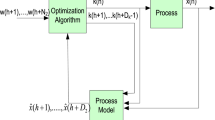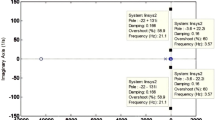Abstract
An improved self-tuning fuzzy proportional–integral–derivative (ISTF-PID), fuzzy logic-based PID (FPID) and optimal PID controllers for speed control of nonlinear hybrid electric vehicle (HEV) are proposed in this paper. The performances of HEV with ISTF-PID, FPID and optimal PID controllers are compared with the performance of HEV with existing self-tuning fuzzy PID and conventional PID controllers. The gains of PID, FPID and ISTF-PID controllers are tuned using multiobjective genetic algorithm. The performance specifications such as integral of the absolute error, integral of the square of error, peak overshoot, rise time and settling time are considered as objective function of GA and for performance analysis of HEV with designed controllers. The proposed control techniques are designed to achieve the variable speed, fuel economy, reduced pollution and improved efficiency under uncertain environment.
Similar content being viewed by others
References
Wirasingha S.G., Emadi A.: Classification and review of control strategies for plug-in hybrid electric vehicles. IEEE Trans. Veh. Technol. 60(1), 111–122 (2011)
Yadav A.K., Gaur P.: Robust adaptive speed control of uncertain hybrid electric vehicle using electronic throttle control with varying road grade. Nonlinear Dyn. 76(1), 305–321 (2014)
Naranjo J.E., Gonzalez C., García R., de Pedro T.: Cooperative throttle and brake fuzzy control for ACC+ Stop & Go maneuvers. IEEE Trans. Veh. Technol. 56(4), 1623–1630 (2007)
Ducusin M., Gargies S., Mi C.: Modeling of a series hybrid electric high-mobility multipurpose wheeled vehicle. IEEE Trans. Veh. Technol. 56(2), 557–565 (2007)
Yadav A.K., Gaur P., Jha S.K., Gupta J.R.P., Mittal A.P.: Optimal speed control of hybrid electric vehicles. J. Power Electron. 11(4), 393–400 (2011)
Liu W.: Introduction to Hybrid Vehicles System Modeling and Control, 2nd edn. Wiley, New York (2013)
Guardiola C., Pla B., Onori S., Rizzoni G.: Insight into the HEV/PHEV optimal control solution based on a new tuning method. Control Eng. Pract. 29(1), 247–256 (2014)
Vasak M., Baotic M., Petrovic I., Peric N.: Hybrid theory-based time-optimal control of an electronic throttle. IEEE Trans. Ind. Electron. 54(3), 1483–1494 (2007)
Jiao X., Zhang J., Shen T.: An adaptive servo control strategy for automotive electronic throttle and experimental validation. IEEE Trans. Ind. Electron. 61(11), 6275–6284 (2014)
Yadav A.K., Gaur P.: AI-based adaptive control and design of autopilot system for nonlinear UAV. Sadhana 39(4), 765–783 (2014)
Attia R., Orjuela R., Basset M.: Nonlinear cascade strategy for longitudinal control in automated vehicle guidance. Control Eng. Pract. 29(1), 225–234 (2014)
Meza J.L., Santibanez V., Sotoand R., Llama M.A.: Fuzzy self-tuning PID semiglobal regulator for robot manipulators. IEEE Trans. Ind. Electron. 59(6), 2709–2718 (2012)
Lin C.-M., Linand M.-H., Chen C.-W.: SoPC-based adaptive PID control system design for magnetic levitation system. IEEE Syst. J. 5(2), 278–287 (2011)
Neath M.J., Swain A.K., Madawalaand U.K., Thrimawithana D.J.: An optimal PID controller for a bidirectional inductive power transfer system using multiobjective genetic algorithm. IEEE Trans. Power Electron. 29(3), 1523–1531 (2014)
Ahn K.K., Truong D.Q.: Online tuning fuzzy PID controller using robust extended Kalman filter. J. Process Control 19(6), 1011–1023 (2009)
Truong D.Q., Ahn K.K.: Force control for press machines using an online smart tuning fuzzy PID based on a robust extended Kalman filter. Expert Syst. Appl. 38(5), 5879–5894 (2011)
Nasir U.M., Abidoand M.A., Rahman M.A.: Real-time performance evaluation of a genetic-algorithm-based fuzzy logic controller for IPM motor drives. IEEE Trans. Ind. Appl. 41(1), 246–252 (2005)
Cheng M., Sun Q., Zhou E.: New self-tuning fuzzy PI control of a novel doubly salient permanent-magnet motor drive. IEEE Trans. Ind. Electron. 53(3), 814–821 (2006)
Yu D.-L., Chang T.K., Yu D.-W.: Fault tolerant control of multivariable processes using auto-tuning PID controller. IEEE Trans. Syst. Man Cybern. B Cybern. 35(1), 32–43 (2005)
Ziegler J.G., Nichols N.B.: Optimum settings for automatic controllers. J. Dyn. Syst. Meas. Control 64(8), 759–768 (1942)
Mudi R.K., Pal N.R.: A robust self-tuning scheme for PI and PD type fuzzy controllers. IEEE Trans. Fuzzy Syst. 7(1), 2–16 (1999)
Chopra S., Mitra R., Kumar V.: Auto tuning of fuzzy PI type controller using fuzzy logic. Int. J. Comput. Cogn. 6(1), 12–18 (2008)
Woo Z.-W., Chung H.-Y., Lin J.-J.: A PID type fuzzy controller with self-tuning scaling factors. Fuzzy Sets Syst. 115(2), 321–326 (2000)
Xu J.-X., Hang C.-C., Liu C.: Parallel structure and tuning of a fuzzy PID controller. Automatica 36(5), 673–684 (2000)
Liu F.-C., Liang L.-H., Gao J.-J.: Fuzzy PID control of space manipulator for both ground alignment and space applications. Int. J. Autom. Comput. 11(4), 353–360 (2014)
Huang, T.-T.; Chung, H.-Y.; Lin J.-J.: A fuzzy PID controller being like parameter varying PID. In: Proceedings of IEEE International Fuzzy Systems Conference. Seoul, Korea (1999)
Yadav, A.K.; Gaur, P.; Mittal, A.P.; Anzar, M.: Comparative analysis of various control techniques for inverted pendulum. In: Proceedings of IICPE-2010 (2011)
Li W.: Design of a hybrid fuzzy logic proportional plus conventional integral–derivative controller. IEEE Trans. Fuzzy Syst. 6(4), 449–463 (1998)
Raviraj V.S.C., Sen P.C.: Comparative study of proportional–integral, sliding mode and fuzzy logic controllers for power converters. IEEE Trans. Ind. Appl. 33(2), 518–524 (1997)
Yadav A.K., Gaur P.: Comparative analysis of modern control and AI-based control for maintaining constant ambient temperature. World Rev. Sci. Technol. Sustain. Dev. 10(1/2/3), 56–77 (2013)
Quang D., Kyoung T., Ahn K.: Force control for hydraulic load simulator using self-tuning grey predictor fuzzy PID. Mechatronics 19(2), 233–246 (2009)
Xu J.-X., Pok Y.-M., Liu C., Hang C.-C.: Tuning and analysis of a fuzzy PI controller based on gain and phase margins. IEEE Trans. Syst. Man Cybern. A Syst. Hum. 28(5), 685–691 (1998)
Mohan B.M., Sinha A.: Analytical structure and stability analysis of a fuzzy PID controller. Appl. Soft Comput. 8(1), 749–758 (2008)
Karasakal O., Guzelkaya M., Eksin I., Yesil E.: An error-based on-line rule weight adjustment method for fuzzy PID controllers. Expert Syst. Appl. 38(8), 10124–10132 (2011)
Karasakal O., Guzelkaya M., Eksin I., Yesil E., Kumbasar T.: Online tuning of fuzzy PID controllers via rule weighing based on normalized acceleration. Eng. Appl. Artif. Intell. 26(1), 184–197 (2013)
Visioli A.: Fuzzy logic based set-point weight tuning of PID controllers. IEEE Trans. Syst. Man Cybern. A Syst. Hum. 29(6), 587–592 (1999)
Tang K.S., Man K.F., Chen G., Kwong S.: An optimal fuzzy PID controller. IEEE Trans. Ind. Electron. 48(4), 757–765 (2001)
Author information
Authors and Affiliations
Corresponding author
Rights and permissions
About this article
Cite this article
Yadav, A.K., Gaur, P. An Optimized and Improved STF-PID Speed Control of Throttle Controlled HEV. Arab J Sci Eng 41, 3749–3760 (2016). https://doi.org/10.1007/s13369-016-2131-5
Received:
Accepted:
Published:
Issue Date:
DOI: https://doi.org/10.1007/s13369-016-2131-5




